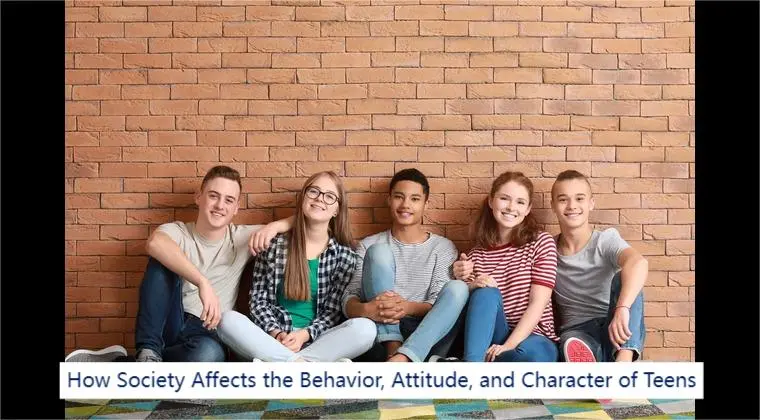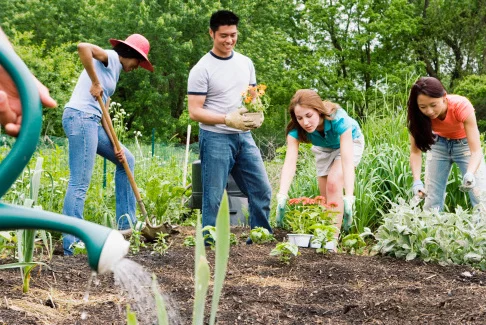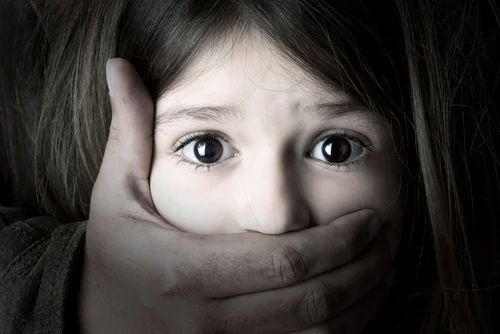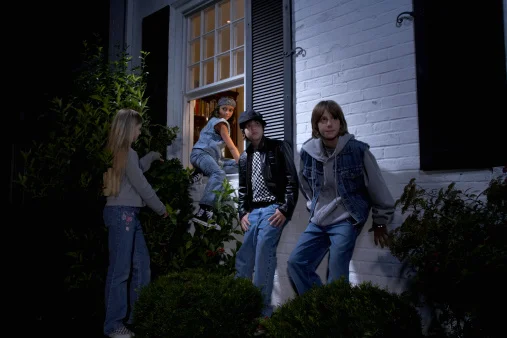+1 845 259 2974 (11 a.m to 7 p.m CST)
How Society Affects the Behavior, Attitude, and Character of Teens

Teenage years are a very important time in a person’s life. During this period, young people grow physically, emotionally, and mentally. They start to understand more about themselves and the world around them. One of the biggest influences on teens during this time is society. Society includes all the people, places, and things around them—family, friends, schools, neighborhoods, media, culture, and more. All these parts of society work together to shape how teens behave, what attitudes they develop, and the kind of character they build.
In this article, we will explore in detail how society affects teens in these three important areas: behavior, attitude, and character.
How Society Shapes Teen Behavior
Behavior means how teens act or respond to different situations. Society plays a big role in teaching teens what kinds of behavior are acceptable and what are not.
Family as the First Influence
The family is the first and most important part of society that teens experience. Parents, siblings, and other close relatives teach teens how to behave through their own actions and words. For example, if parents show respect to others, help those in need, and solve problems calmly, teens are likely to learn and copy these behaviors. On the other hand, if there is a lot of arguing, neglect, or harsh punishment at home, teens may develop negative behaviors such as anger, fear, or withdrawal.
Friends and Peer Groups
As teens grow older, friends and peer groups become very important. Teens want to belong and be accepted by their friends. This desire can lead to positive behaviors, such as working together, sharing, and supporting each other. But it can also lead to risky or harmful behaviors if the peer group encourages things like skipping school, using drugs, or bullying others. Peer pressure is very strong during the teenage years, and it can sometimes push teens to act in ways they might not choose on their own.
School Environment
Schools are like small societies where teens spend many hours each day. Schools teach not only academic subjects but also social rules and values. A school that promotes kindness, fairness, and respect helps teens learn good behavior. Teachers and staff who care about students and treat them fairly create a positive environment. However, if a school has problems like bullying, unfair treatment, or lack of support, teens may develop negative behaviors such as aggression or low motivation.
Neighborhood and Community
The neighborhood where a teen lives also affects their behavior. A safe, clean, and friendly community offers many opportunities for teens to play, learn, and grow. When teens feel safe and supported, they are more likely to behave positively. But if a teen lives in a neighborhood with crime, violence, or poor resources, they may be exposed to harmful behaviors or feel stressed and anxious. This can affect how they act and make choices.
Media and Technology
In today’s world, media and technology are very powerful parts of society. Teens spend a lot of time watching TV, using social media, playing video games, and browsing the internet. These platforms can teach teens new skills, connect them with friends, and provide entertainment. However, they can also expose teens to unrealistic images, harmful content, or cyberbullying. How teens use media and technology can influence their behavior, self-esteem, and even their mental health.
How Society Influences Teen Attitude
Attitude means the way teens think and feel about themselves, other people, and the world. Society helps shape these attitudes in many ways.
Social Norms and Expectations
Every society has rules and expectations about how people should behave and what is important. Teens learn these social norms from their family, friends, school, and media. For example, if society values honesty, kindness, and hard work, teens are more likely to develop positive attitudes toward these qualities. But sometimes society also puts pressure on teens to look a certain way, act a certain way, or achieve certain things. This pressure can cause stress, confusion, or even low self-esteem.
Conflicting Messages
Teens often receive mixed messages from different parts of society. For example, their family might teach them to avoid alcohol, but their friends might say it is fun to drink at parties. Their school might encourage studying hard, but social media might show celebrities living a carefree life without much effort. These conflicting messages can make teens think deeply about what they believe and what they want. Sometimes this helps teens develop their own attitudes and values. Other times, it can cause confusion or make them feel unsure about themselves.
Role Models in Society
Role models are people who teens look up to and want to be like. These can be parents, teachers, coaches, celebrities, or community leaders. Positive role models show teens how to act with honesty, kindness, courage, and respect. When teens see someone they admire behaving well, it encourages them to develop similar attitudes. Negative role models, however, can influence teens to adopt bad attitudes, such as disrespect or selfishness.
How Society Shapes Teen Character
Character is the set of qualities that make a person who they are on the inside. It includes things like honesty, responsibility, kindness, and courage. Society helps teens build their character in many important ways.
Learning by Watching Others
Teens learn a lot by watching the people around them. When they see adults and peers acting fairly, helping others, and standing up for what is right, they begin to understand the importance of these qualities. If teens see selfishness, dishonesty, or cruelty being accepted or rewarded, it can harm their character development.
Understanding Right and Wrong
Society has rules, laws, and consequences for actions. When teens see that bad behavior leads to punishment or loss of trust, they learn to make better choices. This helps them understand the difference between right and wrong. For example, if a teen steals and is caught, the experience teaches them that stealing is not acceptable. This process helps build a strong moral character.
Being Part of a Community
Being involved in clubs, sports teams, religious groups, or volunteer organizations gives teens a chance to practice important character traits. They learn responsibility by showing up on time, teamwork by working with others, and leadership by helping guide a group. These experiences help teens grow into adults who care about others and contribute positively to society.
Developing Independence and Personal Values
As teens get older, they start to think more for themselves. They begin to question what they have been taught and decide what they believe is important. This process helps teens develop their own personal values and a strong character that is not just based on following others. Society provides the environment and experiences that help teens grow into independent, thoughtful adults.
The Role of Parents, Teachers, and Community
While society as a whole influences teens, certain people have a special role in guiding them. Parents, teachers, and community leaders can help teens navigate the many pressures and influences they face.
Parents can create a loving and supportive home where teens feel safe to express themselves and learn from mistakes. They can talk openly with teens about the challenges they face and help them understand the difference between good and bad behavior.
Teachers can create a positive school environment where respect and kindness are valued. They can encourage teens to think critically about what they see in media and peer groups and help them develop their own opinions and values.
Community leaders and organizations can provide safe places for teens to gather, learn new skills, and volunteer. These opportunities help teens feel connected and valued, which supports positive development.
Society is a powerful force that shapes how teenagers behave, what attitudes they develop, and the character they build. Family, friends, schools, neighborhoods, media, and cultural values all work together to influence teens in many ways. Positive influences help teens grow into kind, responsible, and confident adults. Negative influences can lead to confusion, risky behavior, or low self-esteem.
It is important for parents, teachers, and communities to provide good role models, safe environments, and open communication to support teens. Encouraging teens to think for themselves and develop their own values helps them become strong individuals who can make good choices and contribute positively to the world.
In the end, while society shapes teens, teens also have the power to choose their own paths and create the kind of future they want for themselves.



















